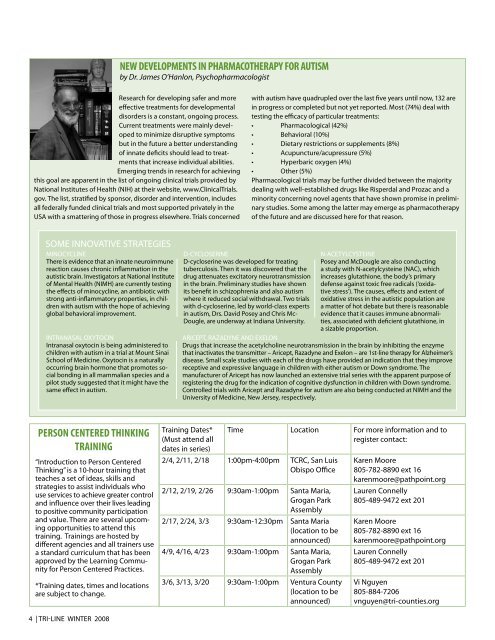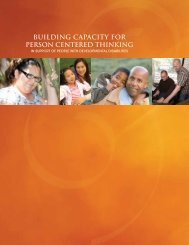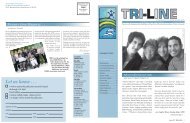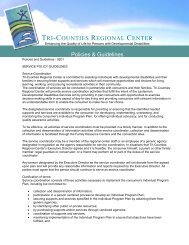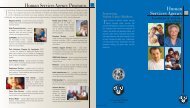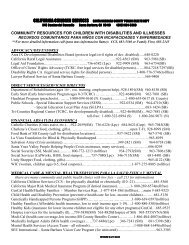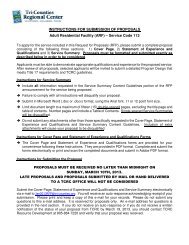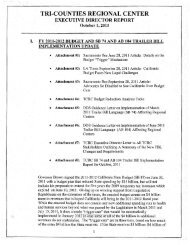TCRC Tri-Line Newsletter - Winter 2008 - Tri-Counties Regional ...
TCRC Tri-Line Newsletter - Winter 2008 - Tri-Counties Regional ...
TCRC Tri-Line Newsletter - Winter 2008 - Tri-Counties Regional ...
You also want an ePaper? Increase the reach of your titles
YUMPU automatically turns print PDFs into web optimized ePapers that Google loves.
NEW DEVELOPMENTS IN PHARMACOTHERAPY FOR AUTISM<br />
by Dr. James O’Hanlon, Psychopharmacologist<br />
Research for developing safer and more<br />
effective treatments for developmental<br />
disorders is a constant, ongoing process.<br />
Current treatments were mainly developed<br />
to minimize disruptive symptoms<br />
but in the future a better understanding<br />
of innate deficits should lead to treatments<br />
that increase individual abilities.<br />
Emerging trends in research for achieving<br />
this goal are apparent in the list of ongoing clinical trials provided by<br />
National Institutes of Health (NIH) at their website, www.Clinical<strong>Tri</strong>als.<br />
gov. The list, stratified by sponsor, disorder and intervention, includes<br />
all federally funded clinical trials and most supported privately in the<br />
USA with a smattering of those in progress elsewhere. <strong>Tri</strong>als concerned<br />
with autism have quadrupled over the last five years until now, 132 are<br />
in progress or completed but not yet reported. Most (74%) deal with<br />
testing the efficacy of particular treatments:<br />
• Pharmacological (42%)<br />
• Behavioral (10%)<br />
• Dietary restrictions or supplements (8%)<br />
• Acupuncture/acupressure (5%)<br />
• Hyperbaric oxygen (4%)<br />
• Other (5%)<br />
Pharmacological trials may be further divided between the majority<br />
dealing with well-established drugs like Risperdal and Prozac and a<br />
minority concerning novel agents that have shown promise in preliminary<br />
studies. Some among the latter may emerge as pharmacotherapy<br />
of the future and are discussed here for that reason.<br />
SOME INNOVATIVE STRATEGIES<br />
MINOCYCLINE<br />
There is evidence that an innate neuroimmune<br />
reaction causes chronic inflammation in the<br />
autistic brain. Investigators at National Institute<br />
of Mental Health (NIMH) are currently testing<br />
the effects of minocycline, an antibiotic with<br />
strong anti-inflammatory properties, in children<br />
with autism with the hope of achieving<br />
global behavioral improvement.<br />
INTRANASAL OXYTOCIN<br />
Intranasal oxytocin is being administered to<br />
children with autism in a trial at Mount Sinai<br />
School of Medicine. Oxytocin is a naturally<br />
occurring brain hormone that promotes social<br />
bonding in all mammalian species and a<br />
pilot study suggested that it might have the<br />
same effect in autism.<br />
D-CYCLOSERINE<br />
D-cycloserine was developed for treating<br />
tuberculosis. Then it was discovered that the<br />
drug attenuates excitatory neurotransmission<br />
in the brain. Preliminary studies have shown<br />
its benefit in schizophrenia and also autism<br />
where it reduced social withdrawal. Two trials<br />
with d-cycloserine, led by world-class experts<br />
in autism, Drs. David Posey and Chris Mc-<br />
Dougle, are underway at Indiana University.<br />
N-ACETYLCYSTEINE<br />
Posey and McDougle are also conducting<br />
a study with N-acetylcysteine (NAC), which<br />
increases glutathione, the body’s primary<br />
defense against toxic free radicals (‘oxidative<br />
stress’). The causes, effects and extent of<br />
oxidative stress in the autistic population are<br />
a matter of hot debate but there is reasonable<br />
evidence that it causes immune abnormalities,<br />
associated with deficient glutathione, in<br />
a sizable proportion.<br />
ARICEPT, RAZADYNE AND EXELON<br />
Drugs that increase the acetylcholine neurotransmission in the brain by inhibiting the enzyme<br />
that inactivates the transmitter – Aricept, Razadyne and Exelon – are 1st-line therapy for Alzheimer’s<br />
disease. Small scale studies with each of the drugs have provided an indication that they improve<br />
receptive and expressive language in children with either autism or Down syndrome. The<br />
manufacturer of Aricept has now launched an extensive trial series with the apparent purpose of<br />
registering the drug for the indication of cognitive dysfunction in children with Down syndrome.<br />
Controlled trials with Aricept and Razadyne for autism are also being conducted at NIMH and the<br />
University of Medicine, New Jersey, respectively.<br />
PERSON CENTERED THINKING<br />
TRAINING<br />
“Introduction to Person Centered<br />
Thinking” is a 10-hour training that<br />
teaches a set of ideas, skills and<br />
strategies to assist individuals who<br />
use services to achieve greater control<br />
and influence over their lives leading<br />
to positive community participation<br />
and value. There are several upcoming<br />
opportunities to attend this<br />
training. Trainings are hosted by<br />
different agencies and all trainers use<br />
a standard curriculum that has been<br />
approved by the Learning Community<br />
for Person Centered Practices.<br />
*Training dates, times and locations<br />
are subject to change.<br />
Training Dates*<br />
(Must attend all<br />
dates in series)<br />
Time Location For more information and to<br />
register contact:<br />
2/4, 2/11, 2/18 1:00pm-4:00pm <strong>TCRC</strong>, San Luis<br />
Obispo Office<br />
2/12, 2/19, 2/26 9:30am-1:00pm Santa Maria,<br />
Grogan Park<br />
Assembly<br />
2/17, 2/24, 3/3 9:30am-12:30pm Santa Maria<br />
(location to be<br />
announced)<br />
4/9, 4/16, 4/23 9:30am-1:00pm Santa Maria,<br />
Grogan Park<br />
Assembly<br />
3/6, 3/13, 3/20 9:30am-1:00pm Ventura County<br />
(location to be<br />
announced)<br />
Karen Moore<br />
805-782-8890 ext 16<br />
karenmoore@pathpoint.org<br />
Lauren Connelly<br />
805-489-9472 ext 201<br />
Karen Moore<br />
805-782-8890 ext 16<br />
karenmoore@pathpoint.org<br />
Lauren Connelly<br />
805-489-9472 ext 201<br />
Vi Nguyen<br />
805-884-7206<br />
vnguyen@tri-counties.org<br />
4 | tri-line WINTER <strong>2008</strong>


